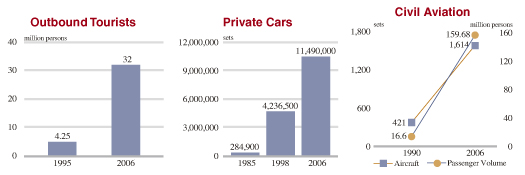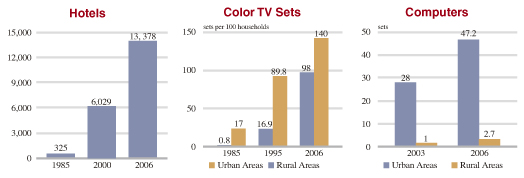|
In summarizing the experience of China's reform and opening-up program, some points should be stressed. First, reform theories should be updated and innovated in accordance with changes in practice in order to guide further reforms. Second, economic construction should be the central task of China's development, which has remained unchanged during the past 30 years under any circumstances. Third, it's wise to stick to the path of socialism, adhere to the CPC leadership and pay respect to reform innovations at the grass-roots level and by ordinary people while implementing the policy, which is conducive to effectively safeguarding the country's unification and social stability against the background of growing diversification of interests in China. Lastly, cultivating a market-oriented economy and implementing the opening-up policy at a gradual pace are needed, so as to ensure China's solid assimilation into the global mainstream.

The root factor behind all these achievements, as Party General Secretary Hu Jintao emphasized in his report to the 17th National Congress of the CPC, is that China has followed the path of building socialism with Chinese characteristics and has formed a theoretical system of socialism with Chinese characteristics. A knowledge of China's basic national condition-the fact that China is at the primary stage of socialism and will remain so for a long time to come-is pertinent to understanding the essence of this theory. To recognize this fact indicates that China has eventually embarked on the road of seeking truth from facts and respecting objective laws.
Besides its achievements and experience, mistakes have also been made and there are lessons to be learned from these.
First, economic growth was achieved at cost of environmental destruction and excessive consumption of resources. If it is safe to say that the economic achievements China has attained in the past 30 years would have taken a Western country a century to do, then it is equally safe to claim that the environmental destruction China has suffered during the period would take any Western country a century to encounter. China's sustainable development is endangered if no changes are made to its developmental model.
Second, the gap between the rich and the poor is widening. It took Japan and South Korea about 20 years to ascend into the club of developed countries in terms of national income. But in China, the overall national income, despite increases in the past 30 years, is still lagging behind many countries.

This is primarily because labor enjoys no preference in the nation's income allocation pattern, though China's huge population is another reason. The wealth created by the people has been transferred into capital and fiscal revenue, in the form of profit and tax, including those to importers in Western countries through granting exporters export subsidies. This imbalanced allocation has worsened the rich-poor gap in China.
Take the Gini index-an indicator of a country's overall income inequality-for example. China's Gini Coefficient index has reached 0.45, or the widely recognized warning boundary, in recent years. The Chinese people feel even stronger about the unfair disparity than people in other countries with similar ratios, as much of the disparity is attributed to monopolies and privilege in China. The government has failed to effectively protect the legitimate rights and interests of the laborers, who as a result can't share in the fruits of the national economic growth. At the initial stage of reform and opening up, China was short of capital but abundant in labor, and as a result, attracting foreign investment became an important task of local governments at all levels, as well as a standard to assess the performance and administrative achievements of officials. The rights and interests of workers, on the contrary, were neglected, and they don't have the rights to collectively negotiate over payment, not to mention all kinds of social rights such as welfare and insurance that are common in developed countries.

China remains a low-income developing country despite the huge achievements it has made over the past 30 years. The basic knowledge, strategic plotting and policies drafted related to reform and opening up in the future should be based on the basic national condition that China remains a developing country in the primary stage of socialism, so that confronting emerging problems in reform and development can be understood. In the reform and opening-up drive in the coming years, the Chinese Government should adhere to its primary experience and fundamental policies of the past 30 years, continue to focus on economic development, promote the role of the market in resource distribution, and seek correct solutions of contradictions and problems that accrue in the process of socio-economic development. |
